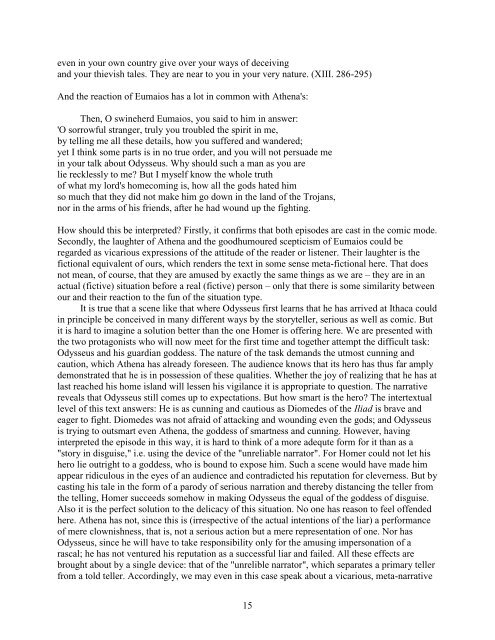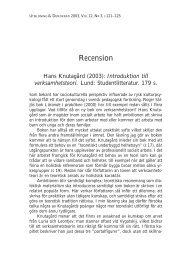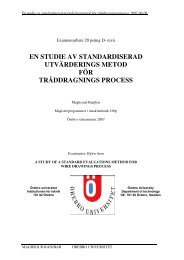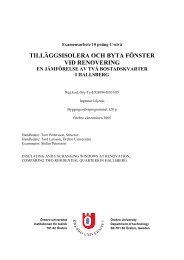Stories in Disguise: On Odysseus' Ithacan Lies and Their Relevance ...
Stories in Disguise: On Odysseus' Ithacan Lies and Their Relevance ...
Stories in Disguise: On Odysseus' Ithacan Lies and Their Relevance ...
Create successful ePaper yourself
Turn your PDF publications into a flip-book with our unique Google optimized e-Paper software.
even <strong>in</strong> your own country give over your ways of deceiv<strong>in</strong>g<br />
<strong>and</strong> your thievish tales. They are near to you <strong>in</strong> your very nature. (XIII. 286-295)<br />
And the reaction of Eumaios has a lot <strong>in</strong> common with Athena's:<br />
Then, O sw<strong>in</strong>eherd Eumaios, you said to him <strong>in</strong> answer:<br />
'O sorrowful stranger, truly you troubled the spirit <strong>in</strong> me,<br />
by tell<strong>in</strong>g me all these details, how you suffered <strong>and</strong> w<strong>and</strong>ered;<br />
yet I th<strong>in</strong>k some parts is <strong>in</strong> no true order, <strong>and</strong> you will not persuade me<br />
<strong>in</strong> your talk about Odysseus. Why should such a man as you are<br />
lie recklessly to me? But I myself know the whole truth<br />
of what my lord's homecom<strong>in</strong>g is, how all the gods hated him<br />
so much that they did not make him go down <strong>in</strong> the l<strong>and</strong> of the Trojans,<br />
nor <strong>in</strong> the arms of his friends, after he had wound up the fight<strong>in</strong>g.<br />
How should this be <strong>in</strong>terpreted? Firstly, it confirms that both episodes are cast <strong>in</strong> the comic mode.<br />
Secondly, the laughter of Athena <strong>and</strong> the goodhumoured scepticism of Eumaios could be<br />
regarded as vicarious expressions of the attitude of the reader or listener. <strong>Their</strong> laughter is the<br />
fictional equivalent of ours, which renders the text <strong>in</strong> some sense meta-fictional here. That does<br />
not mean, of course, that they are amused by exactly the same th<strong>in</strong>gs as we are – they are <strong>in</strong> an<br />
actual (fictive) situation before a real (fictive) person – only that there is some similarity between<br />
our <strong>and</strong> their reaction to the fun of the situation type.<br />
It is true that a scene like that where Odysseus first learns that he has arrived at Ithaca could<br />
<strong>in</strong> pr<strong>in</strong>ciple be conceived <strong>in</strong> many different ways by the storyteller, serious as well as comic. But<br />
it is hard to imag<strong>in</strong>e a solution better than the one Homer is offer<strong>in</strong>g here. We are presented with<br />
the two protagonists who will now meet for the first time <strong>and</strong> together attempt the difficult task:<br />
Odysseus <strong>and</strong> his guardian goddess. The nature of the task dem<strong>and</strong>s the utmost cunn<strong>in</strong>g <strong>and</strong><br />
caution, which Athena has already foreseen. The audience knows that its hero has thus far amply<br />
demonstrated that he is <strong>in</strong> possession of these qualities. Whether the joy of realiz<strong>in</strong>g that he has at<br />
last reached his home isl<strong>and</strong> will lessen his vigilance it is appropriate to question. The narrative<br />
reveals that Odysseus still comes up to expectations. But how smart is the hero? The <strong>in</strong>tertextual<br />
level of this text answers: He is as cunn<strong>in</strong>g <strong>and</strong> cautious as Diomedes of the Iliad is brave <strong>and</strong><br />
eager to fight. Diomedes was not afraid of attack<strong>in</strong>g <strong>and</strong> wound<strong>in</strong>g even the gods; <strong>and</strong> Odysseus<br />
is try<strong>in</strong>g to outsmart even Athena, the goddess of smartness <strong>and</strong> cunn<strong>in</strong>g. However, hav<strong>in</strong>g<br />
<strong>in</strong>terpreted the episode <strong>in</strong> this way, it is hard to th<strong>in</strong>k of a more adequte form for it than as a<br />
"story <strong>in</strong> disguise," i.e. us<strong>in</strong>g the device of the "unreliable narrator". For Homer could not let his<br />
hero lie outright to a goddess, who is bound to expose him. Such a scene would have made him<br />
appear ridiculous <strong>in</strong> the eyes of an audience <strong>and</strong> contradicted his reputation for cleverness. But by<br />
cast<strong>in</strong>g his tale <strong>in</strong> the form of a parody of serious narration <strong>and</strong> thereby distanc<strong>in</strong>g the teller from<br />
the tell<strong>in</strong>g, Homer succeeds somehow <strong>in</strong> mak<strong>in</strong>g Odysseus the equal of the goddess of disguise.<br />
Also it is the perfect solution to the delicacy of this situation. No one has reason to feel offended<br />
here. Athena has not, s<strong>in</strong>ce this is (irrespective of the actual <strong>in</strong>tentions of the liar) a performance<br />
of mere clownishness, that is, not a serious action but a mere representation of one. Nor has<br />
Odysseus, s<strong>in</strong>ce he will have to take responsibility only for the amus<strong>in</strong>g impersonation of a<br />
rascal; he has not ventured his reputation as a successful liar <strong>and</strong> failed. All these effects are<br />
brought about by a s<strong>in</strong>gle device: that of the "unrelible narrator", which separates a primary teller<br />
from a told teller. Accord<strong>in</strong>gly, we may even <strong>in</strong> this case speak about a vicarious, meta-narrative<br />
15

















